Abolition Of Man Quotes & Sayings
Enjoy reading and share 21 famous quotes about Abolition Of Man with everyone.
Top Abolition Of Man Quotes

[ ... ] the sacred - that which is immutable, inviolable and thus infinitely majestic - is in the very substance of our spirit and of our existence. The world is miserable because men live beneath themselves; the error of modern man is that he wants to reform the world without having either the will or the power to reform man, and this flagrant contradiction, this attempt to make a better world on the basis of a worsened humanity, can only end in the very abolition of what is human, and consequently in the abolition of happiness too. Reforming man means bindinghim again to Heaven, reestablishing the broken link; it means tearing him away from the reign of the passions, from the cult of matter, quantity and cunning, and reintegrating him into the world of the spirit and serenity, we would even say: into the world of sufficient reason. — Frithjof Schuon

black studies illuminates the essential role that racializing assemblages play in the construction of modern selfhood, works toward the abolition of Man, and advocates the radical reconstruction and decolonization of what it means to be human. In doing so, black studies pursues a politics of global liberation beyond the genocidal shackles of Man.3 — Alexander G. Weheliye
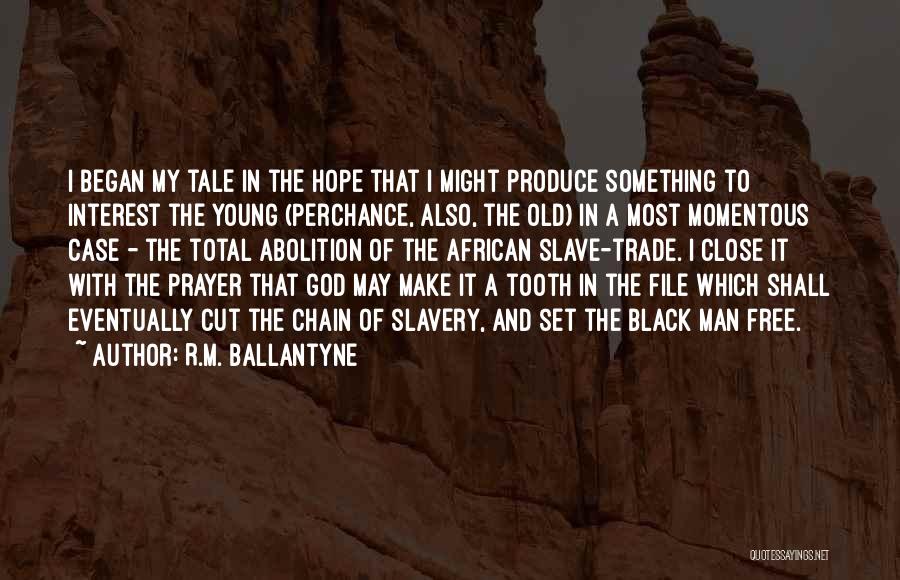
I began my tale in the hope that I might produce something to interest the young (perchance, also, the old) in a most momentous case - the total abolition of the African slave-trade. I close it with the prayer that God may make it a tooth in the file which shall eventually cut the chain of slavery, and set the black man free. — R.M. Ballantyne

C.S. Lewis's Abolition of Man (Appendix). There he lists various universally recognized moral laws and virtues - impartial justice, truthfulness, kindness, mercy, marital fidelity, respect for human life. They have been regarded as true for all from ancient Babylon and Greece to Native America, from Jews and Christians to Hindus and Confucians. — Anonymous
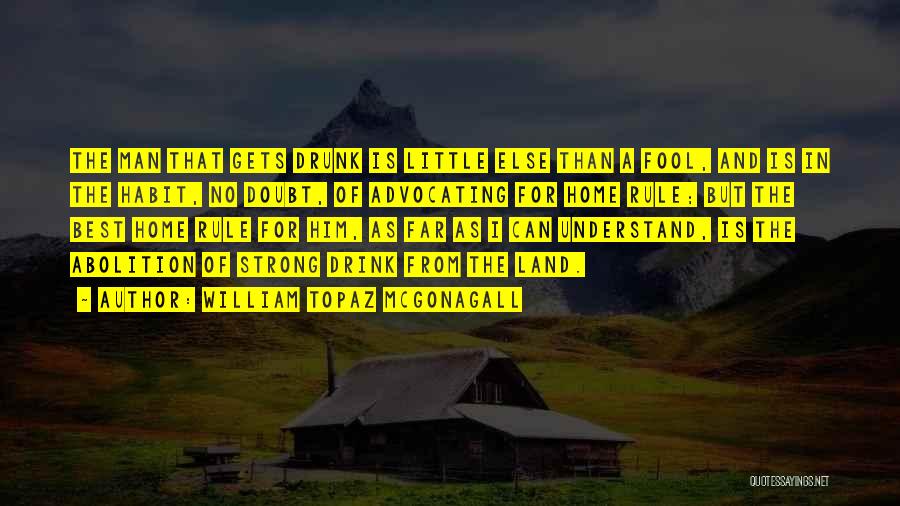
The man that gets drunk is little else than a fool, And is in the habit, no doubt, of advocating for Home Rule; But the best Home Rule for him, as far as I can understand, Is the abolition of strong drink from the land. — William Topaz McGonagall

For millennia, religions in general, and Jewish, Christian, and Islamic churches in particular, have had little problem with the forced enslavement of hundreds of millions of people. It was only after the Age of Reason and the Enlightenment that rational arguments were proffered for the abolition of the slave trade, influenced by and citing such secular documents as the American Declaration of Independence and the French Declaration of the Rights of Man. After an unconscionably long lag time, religion finally got on board the abolition train and became instrumental in helping to propel it forward. — Michael Shermer
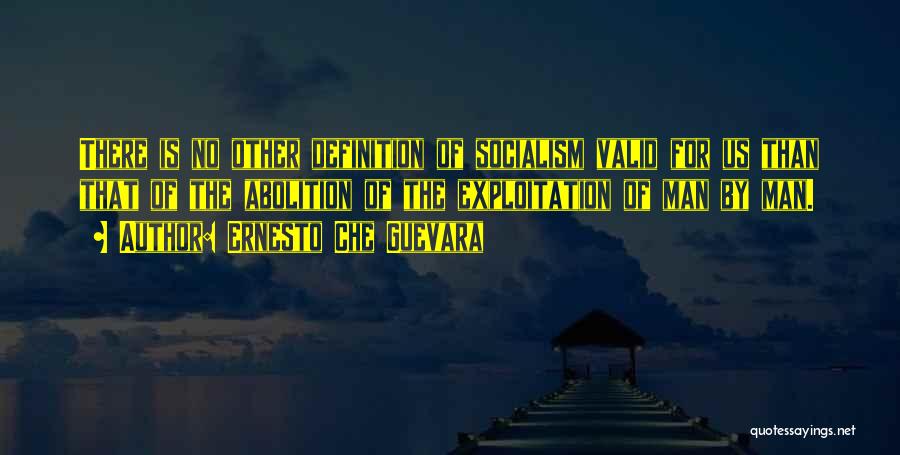
There is no other definition of socialism valid for us than that of the abolition of the exploitation of man by man. — Ernesto Che Guevara

Slavery is such an atrocious debasement of human nature, that its very extirpation, if not performed with solicitous care, may sometimes open a source of serious evils. The unhappy man who has been treated as a brute animal, too frequently sinks beneath the common standard of the human species. The galling chains, that bind his body, do also fetter his intellectual faculties, and impair the social affections of his heart ... To instruct, to advise, to qualify those, who have been restored to freedom, for the exercise and enjoyment of civil liberty ... and to procure for their children an education calculated for their future situation in life; these are the great outlines of the annexed plan, which we have adopted.
[For the Pennsylvania Society for Promoting the Abolition of Slavery, 1789] — Benjamin Franklin

Miss, n. A title with which we brand unmarried women to indicate they are in the market. Miss, Misses (Mrs.) and Mister (Mr.) are the three most distinctly disagreeable words in the language, in sound and sense. Two are corruptions of Mistress, the other of Master. In the general abolition of social titles in this our country they miraculously escaped to plague us. If we must have them let us be consistent and give one to the unmarried man. I venture to suggest Mush, abbreviated to Mh. — Ambrose Bierce
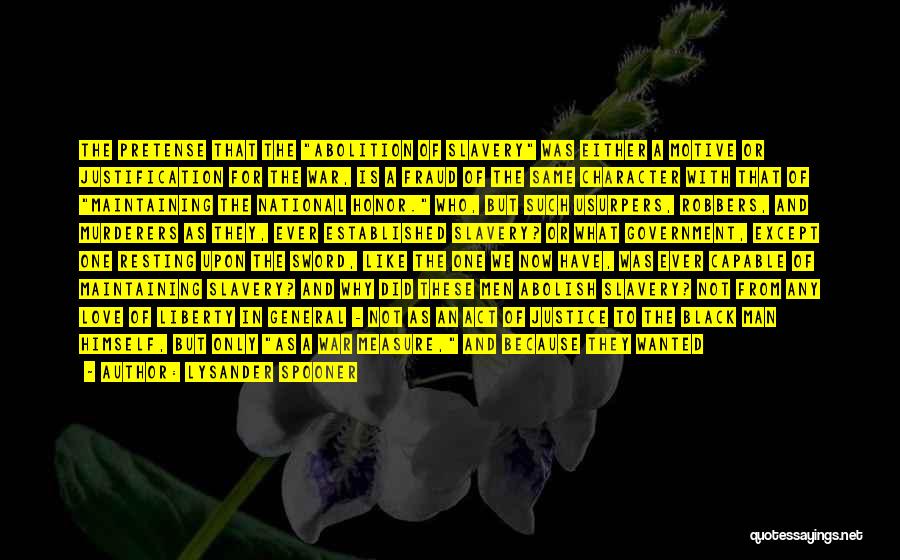
The pretense that the "abolition of slavery" was either a motive or justification for the war, is a fraud of the same character with that of "maintaining the national honor." Who, but such usurpers, robbers, and murderers as they, ever established slavery? Or what government, except one resting upon the sword, like the one we now have, was ever capable of maintaining slavery? And why did these men abolish slavery? Not from any love of liberty in general - not as an act of justice to the black man himself, but only "as a war measure," and because they wanted his assistance, and that of his friends, in carrying on the war they had undertaken for maintaining and intensifying that political, commercial, and industrial slavery, to which they have subjected the great body of the people, both black and white. — Lysander Spooner
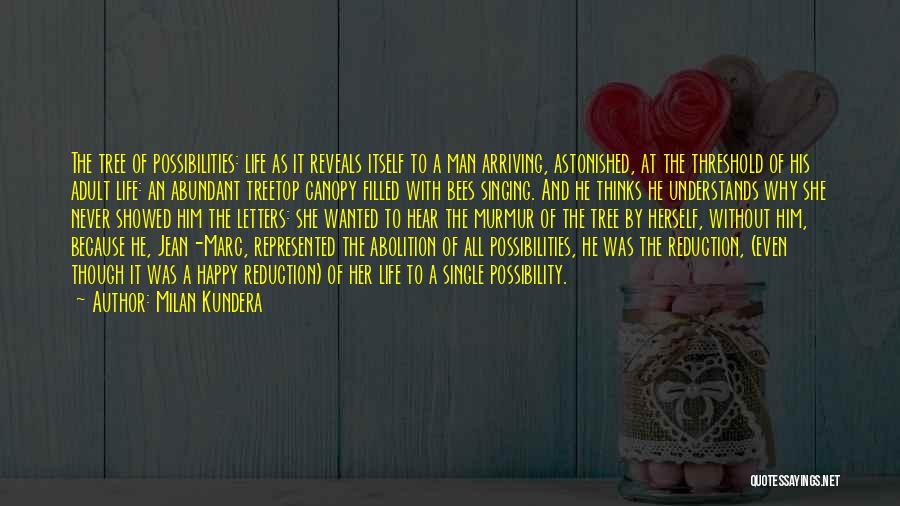
The tree of possibilities: life as it reveals itself to a man arriving, astonished, at the threshold of his adult life: an abundant treetop canopy filled with bees singing. And he thinks he understands why she never showed him the letters: she wanted to hear the murmur of the tree by herself, without him, because he, Jean-Marc, represented the abolition of all possibilities, he was the reduction, (even though it was a happy reduction) of her life to a single possibility. — Milan Kundera

How I hate this world. I would like to tear it apart with my own two hands if I could. I would like to dismantle the universe star by star, like a treeful of rotten fruit. Nor do I believe in progress. A vermin-eaten saint scratching his filth for heaven is better off than you damned in clean linen. Progress doubles our tenure in a vale of tears. Man is a mistake, to be corrected only by his abolition, which he gives promise of seeing to himself. Oh, let him pass, and leave the earth to the flowers that carpet the earth wherever he explodes his triumphs. Man is inconsolable, thanks to that eternal "Why?" when there is no Why, that question mark twisted like a fishhook in the human heart. "Let there be light," we cry, and only the dawn breaks. — Peter De Vries
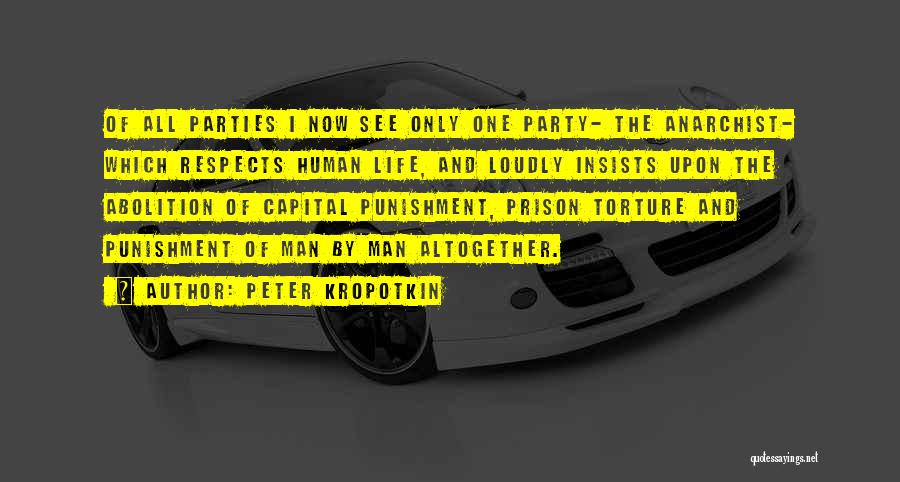
Of all parties I now see only one party- The Anarchist- which respects human life, and loudly insists upon the abolition of capital punishment, prison torture and punishment of man by man altogether. — Peter Kropotkin

A wise man will not leave the right to the mercy of chance, nor wish it to prevail through the power of the majority. There is but little virtue in the action of masses of men. When the majority shall at length vote for the abolition of slavery, it will be because they are indifferent to slavery, or because there is but little slavery left to be abolished by their vote. They will then be the only slaves. Only his vote can hasten the abolition of slavery who asserts his own freedom by his vote. — Henry David Thoreau

Communism deprives no man of the power to appropriate the products of society: all that it does is to deprive him of the power to subjugate the labor of others by means of such appropriation.
It has been objected, that upon the abolition of private property all work will cease, and universal laziness will overtake us.
According to this, bourgeois society ought long ago to have gone to the dogs through sheer idleness; for those of its members who work, acquire nothing, and those who acquire anything, do not work. — Karl Marx
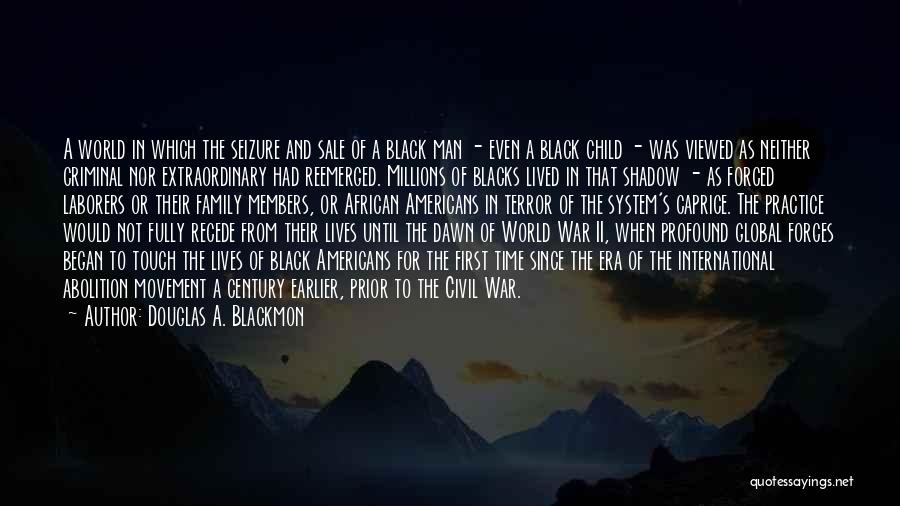
A world in which the seizure and sale of a black man - even a black child - was viewed as neither criminal nor extraordinary had reemerged. Millions of blacks lived in that shadow - as forced laborers or their family members, or African Americans in terror of the system's caprice. The practice would not fully recede from their lives until the dawn of World War II, when profound global forces began to touch the lives of black Americans for the first time since the era of the international abolition movement a century earlier, prior to the Civil War. — Douglas A. Blackmon
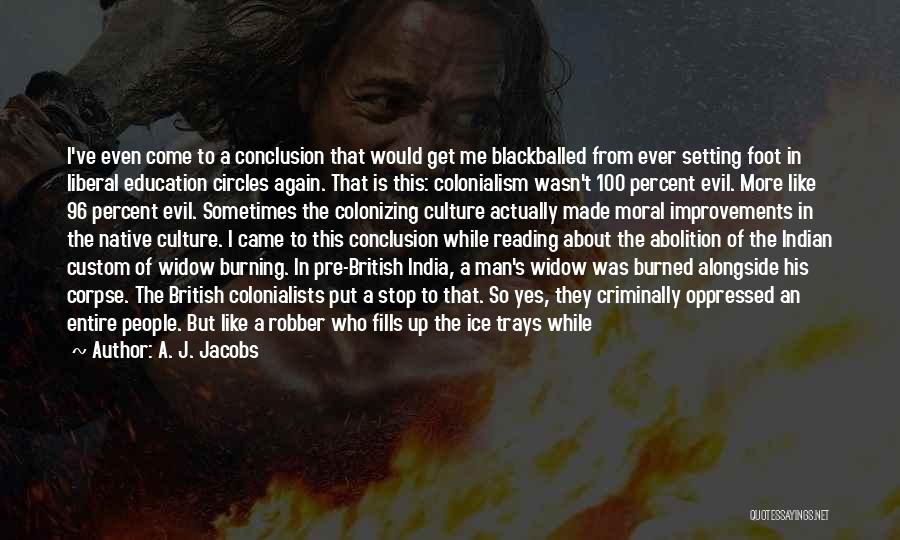
I've even come to a conclusion that would get me blackballed from ever setting foot in liberal education circles again. That is this: colonialism wasn't 100 percent evil. More like 96 percent evil. Sometimes the colonizing culture actually made moral improvements in the native culture. I came to this conclusion while reading about the abolition of the Indian custom of widow burning. In pre-British India, a man's widow was burned alongside his corpse. The British colonialists put a stop to that. So yes, they criminally oppressed an entire people. But like a robber who fills up the ice trays while he steals the TV, they did a smidgeon of good. — A. J. Jacobs
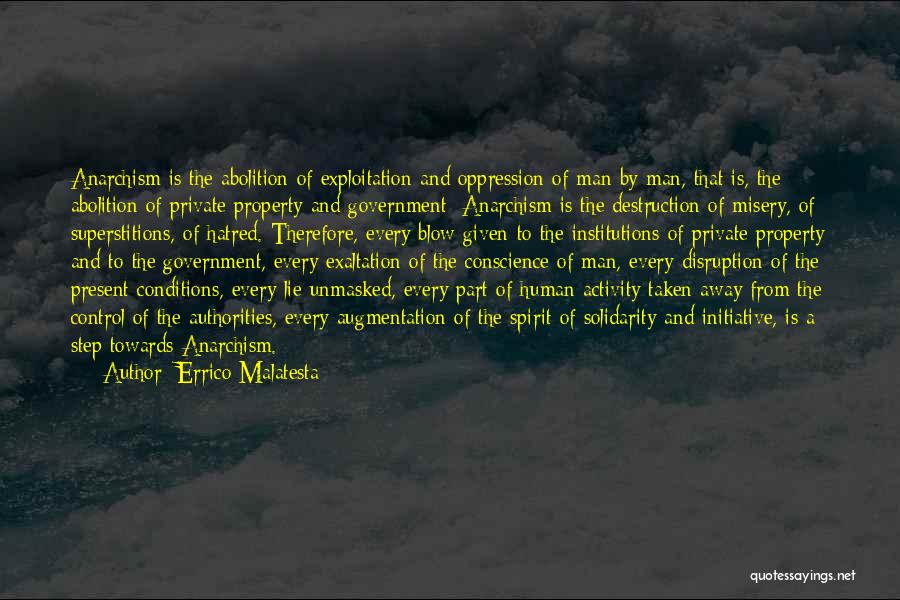
Anarchism is the abolition of exploitation and oppression of man by man, that is, the abolition of private property and government; Anarchism is the destruction of misery, of superstitions, of hatred. Therefore, every blow given to the institutions of private property and to the government, every exaltation of the conscience of man, every disruption of the present conditions, every lie unmasked, every part of human activity taken away from the control of the authorities, every augmentation of the spirit of solidarity and initiative, is a step towards Anarchism. — Errico Malatesta

Knowledge makes a man unfit to be a slave. — Frederick Douglass

I can only say that there is not a man living who wishes more sincerely than I do, to see a plan adopted for the abolition of it - but there is only one proper and effectual mode by which it can be accomplished, and that is by Legislative authority: and this, as far as my suffrage will go, shall never be wanting. — George Washington
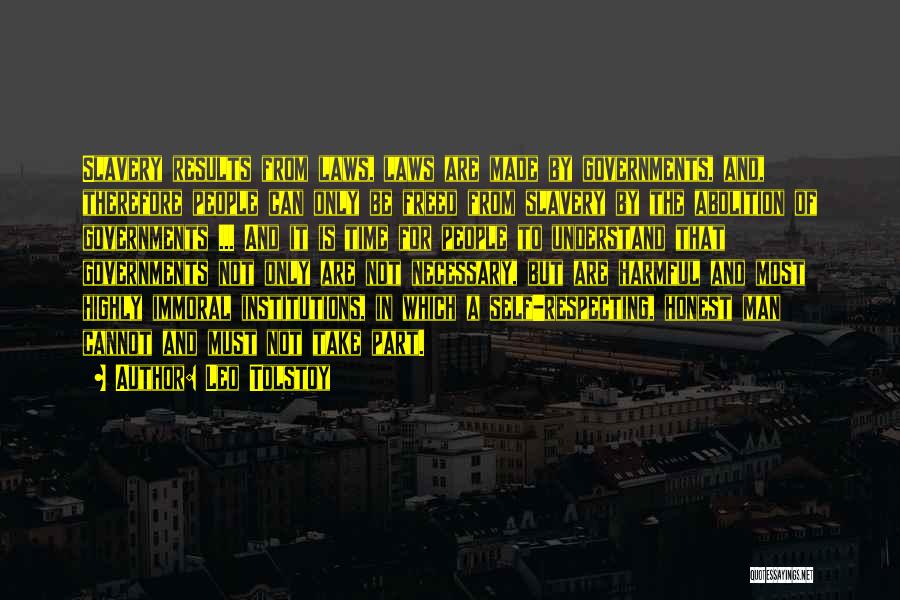
Slavery results from laws, laws are made by governments, and, therefore people can only be freed from slavery by the abolition of governments ... And it is time for people to understand that governments not only are not necessary, but are harmful and most highly immoral institutions, in which a self-respecting, honest man cannot and must not take part. — Leo Tolstoy





